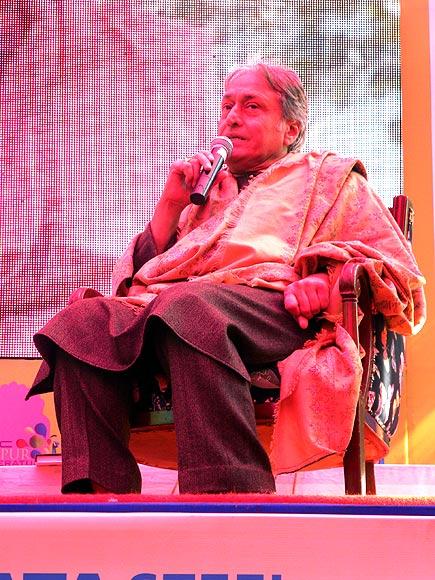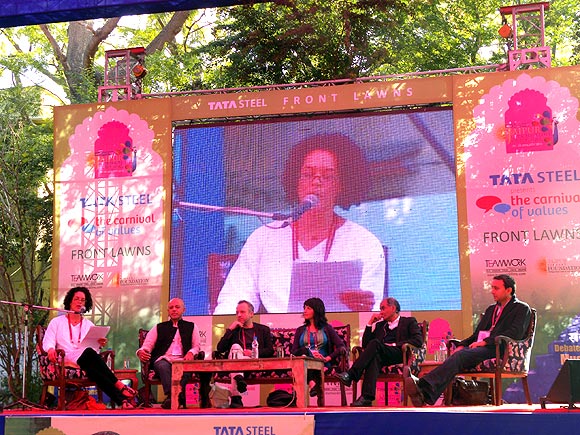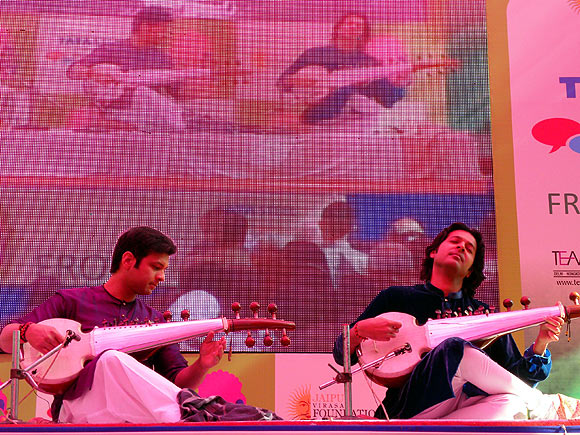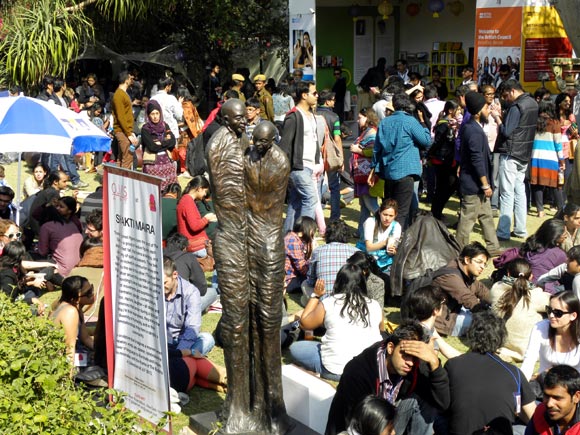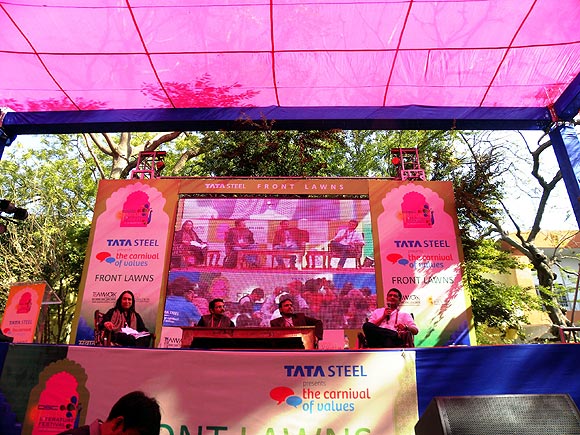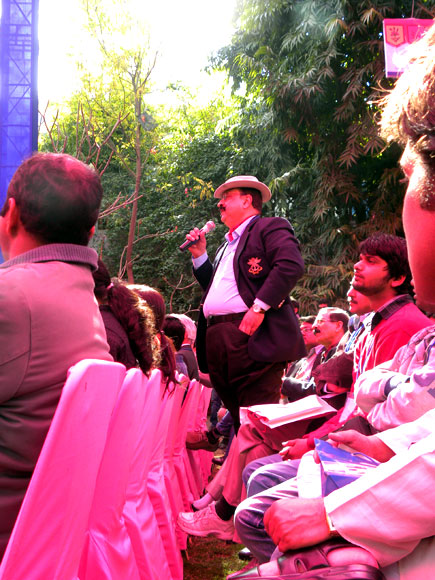 | « Back to article | Print this article |
'Homefull' authors, housefull scriptwriters at JLF
The Jaipur Literature Festival had hundreds of celebrities in attendance. But for a first-timer reporting on this literary event, the most important celebrity was the audience, says Vaihayasi Pande Daniel
If you believe in afterlife, than you definitely have to wonder what the souls of the various departed Khangarot Thakurs, who once lived at Jaipur's 19th century Diggi Palace, must think of the strange goings at their once peaceful ancestral mahal, every January.
Of this invasion of exotic poets, philosophers, lekhaks, musicians, foreigners and strangely-clad countryman (I mean, boots, fedoras?!).
Of the strange voices whispering about even stranger issues...
Global souls, sex determination, Jewish magicians, creating film scripts, Afghan kings and the decline of America were some of the wildly disparate issues that rocked Diggi Palace on the fourth day of the Jaipur Literature Festival.
The arrival of Ustaad Amjad Ali Khan, India's most famous sarod player, was a delight one seldom has the honour to experience.
Even more enchanting was the performance by his sons -- Amaan and Ayaan Ali Khan. Dressed like charming princes of music, in rich velvet and silk kurtas, the brothers deftly played a lively piece dedicated to Rabindranath Tagore that brought vivid visions of the lyrical Bengal countryside.
Click no NEXT for more...
Jaipur Lit Fest: Day 4
The first session of the day -- with Abraham Verghese (India-Ethiopia-US), Aminatta Forna (Britain-Scotland-Sierre Leone), Pico Iyer (Britain-India-US-Japan), Akash Kapur (India-US), Laleh Khidiva (Kurdistan-Iran-US), Sadakat Kadri (Britain-India-Pakistan-Finland) in attendance, apart from flocks of excited parrots (Jaipur) cackling in the trees above -- was devoted to global souls, a particularly apt discussion for a fest where half of the participants/audience were traveling souls themselves.
A young man from Rajasthan got up to ask why the panelists felt only they were homeless when he felt homeless after moving towns within Rajasthan.
"I miss my mother's cooking and feel homeless," he said.
Kurdish writer Laleh Khidivi (The Age of Orphans), whose family migrated after the Iranian revolution to the United States, preferred to call it 'homefull' rather than homeless.
Iyer's inspired take on globalisation and the soul, "If globalisation is really having an effect it should be at the level of the soul, the conscience or the heart. How is globalisation causing us to dream differently, love differently, make life of a different kind."
Click on NEXT for more...
Jaipur Lit Fest: Day 4
He continued, "The simplest questions are ever more complicated to answer -- notions of belonging, home, what's your community, these take a lifetime to answer and you may never actually answer them".
"In my case, when someone asks me, 'where do you come from?' You couldn't have a simpler question. But I could say my ancestry is entirely Indian but I have never lived a single day of my life in India, I don't speak a single word of an Indian language. If where do you come from means where were you born, raised and educated, then I am entirely of England. But I left England as soon as I finished my education and I have never been a grown up there.
"If where you come from means where you pay your taxes, where is your dentist, where is your doctor then I belong to the United States. For nearly all these years, I have this pinkish card with green lines through my face calling me a permanent alien. And the longer I am there, the more alien I feel and the more alien it feels.
"If where do you come from means which place is close to you and where do you spend the majority of your time, I have lived in Japan for 25 years now. Yet, all the 25 years I have lived there has been on a tourist visa and I don't think any Japanese would be keen to claim me as part of his group.
"For more and more of us, the notion of home is a work in progress, it is like a book we are constantly revising and adding to it. In some sense, for some people, home is not a piece of soil but almost a piece of soul, values and friendships you carry around with you. Home has much less to do with where you born but where you become yourself. More and more human beings are turning into snails, carrying their homes with them," he said.
Click on NEXT for more...
Jaipur Lit Fest: Day 4
Akash Kapur (India Becoming – A Portrait of Modern India) said when someone asks him where he is from, he either gives them a ten-minute answer or a half-a-second one, depending on who the person is. He says he feels like a "chameleon". But he disagrees with Iyer and says he does feel connected to a piece of soil.
Forna said she is always puzzled why she is persistently asked where she is from. She says the questions seems be about "their (the questioner's) anxieties and not mine" since where she comes from does not pose a problem to her. But she says that she learned that that question has many meanings. Forna adds that a Croatian writer once wrote that, that question is benign in peacetime but in wartime could be mistaken for "Am I one day going to have to kill you?"
Verghese felt comfortable with who he is and has always celebrated his Ethiopian roots. But he says he will be scarred all his life from losing his first home Ethiopia when his family was driven out. The loss of that childhood home is still traumatic.
Kadri (travel lawyer, Heaven on Earth: A History of Sharia Law and international lawyer) , recalled that at a certain point in his life, when he was being harassed for his South Asian origins in Britain, finding out where he was from was very important. But he differs with the other global souls on the lit fest stage in believing, "(Belonging) to a global tribe is a romantic notion and the notion that can one just be a rolling stone is a luxury depending on having access to time and money."
Click on NEXT for more...
Jaipur Lit Fest: Day 4
The most attended session of Day 4 was a conversation between Bollywood author Nasreen Munni Kabir and screenplay writers Neelesh Misra (Ek Tha Tiger), Jaideep Sahni (Chakh De, Khosla Ka Ghosla) and Gaurav Solanki. If any young screenplay writer is gaining star status, it is quite obviously Sahni, judging by the ovation/claps he received in Jaipur.
Sahni in conversation is rather entertaining. He has a wry, self-deprecating sense of humour that he puts across in Hinglish often.
Kabir asks him what is required to become a successful scriptwriter and he advocated endless patience, a second job, 20 years of savings in the bank and a family in which every member has a job.
A theme that ran through the whole five days of the Jaipur Lit Fest was the painful sigh about the extinction of India's nostalgic films. In a moment of irritation, Sahni remarked, "Nostalgia is to be enjoyed" and said it should not be used as a weapon to "beat" young screenwriters with. "We write for our times," he said
Gaurav added, "People always like the films of our youth."
Misra felts that scriptwriters, after their first successes, eventually move to Mumbai to be closer to the film industry and that often slowly eats into the originality of their future scripts. He believes that to write best, you have to stay away from Mumbai.
Much wordage was devoted to The Interval Issue. Bet you don't know what that is...
Sahni called it a "valid pain in the butt."
The issue is about strategically working an interval into your script which cinema halls require to get popcorn sales. After the interval, when the audience comes back satiated with popcorn and having chit-chatted with friends, according to Sahni, they are no longer clued into the mood of your film and a scriptwriter has to quickly and adroitly bring the audience up to speed.
Equally important -- if it is a serious film -- is to make sure your audience comes back!
Misra said he did not mind the pain/sting of an interval because it is an interesting challenge.
Sahni added that the interval is an "item" of its own; the "kaju-kishmish" of a film.
Click on NEXT for more...
Jaipur Lit Fest: Day 4
The Jaipur festival had hundreds of celebrities in attendance. But for a first-timer reporting on this literary event, the most important celebrity is the audience!
He is an ordinary young man/woman, often scruffily/colourlessly dressed -- who when his cellphone rings, mid-fest, quickly murmurs into it "Mein Jaipur mein hoon. Literature mein hoon. Vapas phone karunga -- who faithfully attends each session, listens attentively to each discussion, even horribly abstruse ones like that of Columbia professor Gayatri Spivak, asks pertinent questions and, in spite of your silly, unreal, elitist notions, you realise, "By golly, he reads."
And when you look at the thousands of non-descript literature-wallahs, who crowd the venues, you mutter "By jove, India really reads" .
Click on NEXT for more...
TOP photo features of the week
Click on MORE to see another set of PHOTO features...
